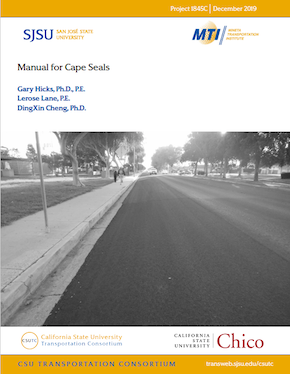- 408-924-7560
- mineta-institute@sjsu.edu
- Donate
Manual for Cape Seals
Cape seals are valuable preservation treatments for roads which receive light to medium traffic, and have also performed well on higher-volume roadways. Cape seals are surface treatments which are placed on an existing asphalt pavement.
Cape seals are a multi-layered treatment pavement preservation treatment. First, a chip seal is placed by spraying the pavement with a binder—either an asphalt emulsion or a hot applied asphalt binder—from a distributor truck, and then immediately applying a uniform application of a cover aggregate (a.k.a. chips, or screenings) using a self-propelled chip spreader. The aggregate is quickly rolled to ensure embedment and adhesion of the aggregate to the binder. A slurry surfacing is then applied on top of the chip seal. A slurry surfacing could either be a slurry seal or a microsurfacing. The slurry surfacing provides for a smooth surface, which is desired in most city and residential areas.
This manual presents information on project selection, mix design, and construction to ensure a superior product. It also includes some typical specifications for chip seals and slurry surfacing used for cape seals.
R. GARY HICKS, PhD, PE
Dr. Hicks is currently program manager for the CP2 Center at CSU Chico. Prior to joining the Center, he taught at Georgia Tech and Oregon State University for 30 years rising to a Distinguished Profess of Civil Engineering and the Associate Dean for Research for the College of Engineering. He retired from OSU in 1997, and upon retirement embarked on a consulting career with MACTEC Engineering (now Wood LLC) providing on call consulting services to the California Department of Transportation, and other organizations. As a part of this project he led the development of the MTAG and helped set of the CP2 Center in 2006. He is a registered Civil Engineer in the states of California, Oregon and Alaska.
LEROSE LANE, PE
Lerose Lane, PE, is a Senior Pavement Preservation Engineer, who has worked for the California Pavement Preservation Center (CP2C) since August 2010. Her work includes observing pilot project construction for a wide variety of preservation strategies including: Rubberized Chip Seals, Scrub Seals, Reconstruction with Rubberized Hot Mix Asphalt Concrete, and Double Chip Seals. Most of these projects had various Pavement Evaluation Sections (PESs) which she has evaluated over a period of several years. Besides observing and evaluating construction and long-term performance of this wide variety of preservation strategies, she writes many of the technical reports regarding the construction phases and the follow up inspection reports. Most of these projects are Caltrans projects on State Highways or Interstate routes. She graduated from CSU, Chico, in 1970 with a B. S. degree in Civil Engineering. Since that time, she has worked for UCD, City of Marysville, County of Tehama, and Caltrans in various capacities including: District Materials Engineer, Office Chief in Design, Senior Construction Engineer, as well as a Resident Engineer for a wide variety of projects. As District Materials Engineer, she supervised and managed the District 2 testing laboratory, was on various technical committees, and worked with the Construction Seniors, Project Engineers, Office Chiefs, as well as with the Project Managers to develop their work plans. She has been a Professional Engineer in the State of California since 1975.
DINGXIN CHENG, PhD, PE
Dr. DingXin (Ding) Cheng is a professor of the department of civil engineering at the California State University, Chico, director of the California Pavement Preservation (CP2) Center, and the director of the Tire Derived Aggregate Technology Center. He has worked actively with the CP2 Center since he joined the department of civil engineering of CSU Chico in 2006. He obtained his PhD in the areas of pavement materials and transportation from Texas A&M University in College Station, Texas in 2002. He worked in private industry for Parsons Brinckerhoff in Houston, TX before joining the Chico State University. He has extensive experiences in Hot Mix Asphalt (HMA) materials and pavement preservation on both asphalt and concrete pavements. He has more than 55 peer-reviewed publications related to pavement materials and preservation in Transportation Research Board, AAPT, ASCE, and other conferences. Ding has co-managed or managed more than $7 million research projects funded by California Department of Transportation (Caltrans), California Department of Resources Recycling and Recovery (CalRecycle), Metropolitan Transportation Commissions (MTC) of San Francisco Bay Area, and other agencies and industry. He is a registered civil engineer in the state of Texas.
-
Contact Us
San José State University One Washington Square, San Jose, CA 95192 Phone: 408-924-7560 Email: mineta-institute@sjsu.edu






